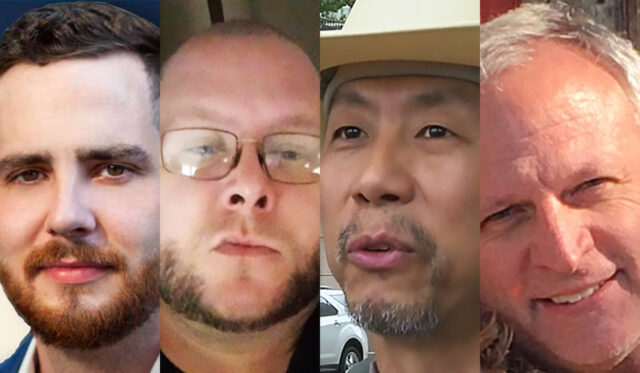
While only three of seven mayoral candidates met the 10 percent polling threshold to participate in the Aug. 8 Tulsa Two Step debate, NonDoc offered the other four candidates the opportunity to respond in writing to a series of questions about their campaigns and priorities.
Sent five questions about the Tulsa mayoral race, candidates Kaleb Hoosier, Paul Tay and John Jolley responded with answers that appear below unedited and in the order of submission. Casey Bradford did not reply by an Aug. 19 deadline but said he would respond by the evening of Aug. 22. He did not.
To watch and read a recap of the Tulsa Two Step mayoral debate between candidates Karen Keith, Monroe Nichols and Brent VanNorman, click here.
(Editor’s note: Navigate the candidate answers by clicking the arrows below.)
1Kaleb Hoosier
1) Considering your background and personality, what most qualifies you to be mayor of Tulsa?
I have the highest level of intelligence, I am the most well-connected, I am the most famous, I destroy Evil Multibillion dollar corporations that would do harm to our citizens and I’m a person of the people.
2) What is the biggest challenge facing the city as a whole, and what would you do about it as mayor?
My people’s happiness is the biggest concern of the City, and it’s a surprise what I’m going to do about it.
3) What actions should be taken to improve access to housing and to address homelessness in Tulsa?
this idea was taken from me but 3D printing affordable housing is the most effective way to address homelessness, i can prove the idea was stolen from me.
4) Tulsa’s economic development advocates say they want a “partner” in the mayor’s office to help recruit businesses to the city. How do you convince economic development groups that you are the leader they are looking for?
this goes back to me being the most well-connected, I know many captains of industry I also have beef with many captains of industry, any business wanting to set up shop from out of state into Tulsa will be thoroughly vetted by my administration to make sure they are a good fit for the people, Industry with a focus on employment rather than bleeding workers dry for shareholders will be prioritized.
5) The Bynum administration has taken the position in multiple court cases that the city still has jurisdiction to adjudicate municipal criminal offenses, such as traffic tickets. But the 2020 U.S. Supreme Court decision in McGirt v. Oklahoma means Tulsa’s boundaries are within the Muscogee and Cherokee reservations — at least for purposes of criminal jurisdiction — and the tribes have argued Tulsa cannot adjudicate traffic offenses and the like against tribal citizens. If you become mayor, will your administration continue to pursue criminal jurisdiction over tribal citizens in Tulsa?
In McGirt v. Oklahoma, the Supreme Court ruled that criminal cases involving tribal members on tribal lands, such as Muscogee Creek Nation, should not be tried in a state court. This means that Native Americans reserve the right to prosecute crimes committed on their land by or on tribal members or A federal court, and the Supreme Court decision will be upheld.
(Editor’s note: Hoosier quickly followed up his response above with a clarification.)
Just to clarify my statement about tribal courts, I would assume how it would work is, per usual local law enforcement TPD HYPO, would still be making the arrests but the cases being referred off to other courts for trial/persecution at light horse or where ever
2Paul Tay
1) Considering your background and personality, what most qualifies you to be mayor of Tulsa?
I’ve always spoke truths to power.
2) What is the biggest challenge facing the city as a whole, and what would you do about it as mayor?
The biggest challenge facing the City as a whole is transferring all governmental interests and proprietary rights to Cherokee and Muscogee Creek Nations pursuant to the Oklahoma Supreme Court’s conclusion, affirming all my allegations the City of Tulsa and State of Oklahoma are illegally squatting on appropriated land encumbered by United States treaties with Muscogee Creek and Cherokee Nations:
“By the same process of reasoning followed by the Supreme Court of the United States in cases of United States v. McBratney, supra, and Draper v. United States, supra, we conclude that the Congress, upon the admission of Oklahoma as a state, where it has intended to except out of such state an Indian reservation, or the sole and exclusive jurisdiction over that reservation, it has done so by express words.” Higgins v Brown. 1908 OK 28. https://law.justia.com/cases/oklahoma/supreme-court/1908/3329.html
3) What actions should be taken to improve access to housing and to address homelessness in Tulsa?
Applying the Oklahoma Supreme Court Higgins conclusion, the City’s jurisdiction and authority to decide public policy on treaty-defined land is void ab initio. If the Oklahoma Supreme Court falls on her own stare decisis sword and voids her own credibility to allow City elections on treaty-defined land, the next Mayor should execute the executive order to transfer power to the Cherokee and Muscogee Creek Nations.
4) Tulsa’s economic development advocates say they want a “partner” in the mayor’s office to help recruit businesses to the city. How do you convince economic development groups that you are the leader they are looking for?
Tulsa’s economic development advocates settled on treaty-defined land are subject to $1,000 federal fine and removal by the United States military Commander-in-Chief under martial law conditions established by the Indian Removal Act and Executive Order 9066, pursuant to preempting federal law 25 USC 180.
If Todd Kim, Assistant Attorney General, Department of Justice, Environmental And Natural Resources Division, has any credibility as the federal fiduciary to the Cherokee and Muscogee Creek Nations, he would bring federal criminal complaints against the State and municipal power infrastructure for seditious conspiracy, 18 USC 2384, obstructing and delaying the execution of the laws of the United States.
5) The Bynum administration has taken the position in multiple court cases that the city still has jurisdiction to adjudicate municipal criminal offenses, such as traffic tickets. But the 2020 U.S. Supreme Court decision in McGirt v. Oklahoma means Tulsa’s boundaries are within the Muscogee and Cherokee reservations — at least for purposes of criminal jurisdiction — and the tribes have argued Tulsa cannot adjudicate traffic offenses and the like against tribal citizens. If you become mayor, will your administration continue to pursue criminal jurisdiction over tribal citizens in Tulsa?
The Bynum Administration is on the wrong side of the vast preponderance of Constitutional provisions, preempting federal law codifying United States treaties with the Cherokee and Muscogee Creek Nations, and the Oklahoma Supreme Court Higgins conclusion. The U.S. Supreme Court predicted McGirt would affect both civil and criminal cases on appropriated land encumbered by United States treaties with Cherokee and Muscogee Creek Nations.
Though the Supreme Court ruled Oklahoma retains concurrent criminal jurisdiction on treaty land under the General Crimes Act and Public Law 280 in Castro-Huerta, the Oklahoma Supreme Court concluded the State is of want of any jurisdiction and authority under the Oklahoma Enabling Act which solidified treaty rights.
Under preempting federal law, 25 USC 71, implicating, recognizing, and congressionally codifying all treaties lawfully executed prior to 3 March 1871, the State and the City has no jurisdiction on treaty land. Even the Oklahoma Administrative Code on marijuana, 442:10-1-3, says marijuana licenses are invalid on “any tribal trust or tribal restricted land or federal lands in the state.”
The State and the City routinely cite United States v McBratney and Draper v United States to justify her sham jurisdiction over white non-Indians on treaty-defined land. The Oklahoma Supreme Court used the same reasoning in those cases to come to the Higgins conclusion voiding ab initio State and municipal elections on treaty-defined land. It is beyond reasonable doubt Congress intended that the State of Oklahoma and the City of Tulsa can only exercise competent jurisdiction on unappropriated land unencumbered by United States treaties with the Cherokee and Muscogee Creek Nations.
3John Jolley
1) Considering your background and personality, what most qualifies you to be mayor of Tulsa?
A Mayor is only as Good, as Those Who are serving and supporting Him.
The Key Part of being a Good Mayor is to be a Strong Leader.
This, I Believe, is One of My Strongest Traits.
I grew up in a small town in a Family that was not Financially Wealthy, but was Rich in Character.
My Grandmother taught Me that ‘Money does not Buy Class, for
Class comes from within.
I see People for Who They are and will lead Them accordingly.
I have lived in Tulsa for over 40 years, working first as a Petroleum Engineer and later as Owner of an Advertising Company.
During My 29 years of running My Advertising Company, I have felt the ‘Pulse’ of Tulsa – I can see where Our City needs to go and what Our People Need.
There is no one in this Race, Who Loves Tulsa more then I.
Lastly, if elected, I would run My Beloved City of Tulsa as One of My Heroes once led Our Great County – former President Jimmy Carter. I would Lead My Beloved City of Tulsa with Honor, Integrity, Compassion, Kindness, Grace, and Decency.
2) What is the biggest challenge facing the city as a whole, and what would you do about it as mayor?
My Number One Priority as Mayor would be to Support and Defend Tulsa Public Schools.
I feel that a City is only as Strong as Its Public Schools; for without a thriving Public School System, a City will not Evolve and Prosper. However without a Strong Public School System, a City will begin a slow and debilitating descent.
As Mayor I will do all I can to Support and Work with the Superintendent of Tulsa Public Schools – Dr. Ebony Johnson.
I will also Stand as Defender against the Hostile Actions of Any Who attempt to Attack and Weaken the Tulsa Public School Systems.
My Daughter is a Student of Tulsa Public School, and I know how Wonderful the Teachers, Coaches, and Administrators are.
These Beautiful, Caring Humans Deserve Our Support.
3) What actions should be taken to improve access to housing and to address homelessness in Tulsa?
Homelessness is not a new problematic issue and there is no quick fix. It began in the early ‘80’s, when the Federal Government released all the Mentally Ill onto the streets.
Soon, those with debilitating addictions would join those folks already on said Streets.
During Recent Times, ‘The Darkness’ of Our Recent Pandemic put Folks on the Streets, who had no Intention to be There – Life Just Happened. First, We must help the latter, for They can and will be Productive Members of Our City.
We do this by offering them a ‘hand’ – temporary housing and financial help, as They get Their Life back together.
These People must be given Hope, for without Hope and Belief in Oneself – There can never be Hope for a Brighter Future.
For those on the Streets, due to addictions and mental illness, Tulsa must continue to make strides as it finds methods to address their needs – housing, counseling, medication, etc.
This will not be an easy or quick task.
Tulsa must work with those non-profits already working to address this situation and making the work more Organized and Streamlined.
4) Tulsa’s economic development advocates say they want a “partner” in the mayor’s office to help recruit businesses to the city. How do you convince economic development groups that you are the leader they are looking for?
I Love Tulsa, making The City My Beloved Home for over 40 years! Tulsa is a Beautiful City that should be Promoted – the Parks, the Arts (Music, Museums, Productions (Television and Film)), the Art Deco Architecture, and the Beautiful Seasons – just to name a few.
Tulsa should Promote is Central Location within the United States and Its Affordability.
We must have a Fabulous Public School System, for These Folks have Kids and want to ensure Their Success.
Yet, the Biggest Promotion for Tulsa is its People. They are not Perfect, but They are Hardworking, Kind, Decent, and full of Compassion.
5) The Bynum administration has taken the position in multiple court cases that the city still has jurisdiction to adjudicate municipal criminal offenses, such as traffic tickets. But the 2020 U.S. Supreme Court decision in McGirt v. Oklahoma means Tulsa’s boundaries are within the Muscogee and Cherokee reservations — at least for purposes of criminal jurisdiction — and the tribes have argued Tulsa cannot adjudicate traffic offenses and the like against tribal citizens. If you become mayor, will your administration continue to pursue criminal jurisdiction over tribal citizens in Tulsa?
The Simple Answer is NO.
Yet, the Solution is more complex.
Tulsa sits on Indian Ground.
For Far too Long, Oklahomans did not value or include the Indian Nations in its Decision-making Process. The Nations did not receive a Seat at the Table – This was an Insult.
At the Time, the Tribal Governments do not have the ability to handle All the Criminal Cases in a timely method.
Tulsa must work with the Tribal Nations to Aid Them in Getting to the Place that They need to be.
The Tribal Nations deserve a Voice and the City of Tulsa can give Them a Voice as They work Together to get what needs to be done.
Charges should and will be continued to be made for Any who break the Laws of The City of Tulsa, but the City of Tulsa and the respective Indian Tribes will work Together to Take Care of the Business Needed for the Tribal Members.
It is Past Time for the Indian Nations to Receive Their Deserved Respect from the State of Oklahoma and the City of Tulsa.
4Casey Bradford
1) Considering your background and personality, what most qualifies you to be mayor of Tulsa?
(Did not respond)
2) What is the biggest challenge facing the city as a whole, and what would you do about it as mayor?
(Did not respond)
3) What actions should be taken to improve access to housing and to address homelessness in Tulsa?
(Did not respond)
4) Tulsa’s economic development advocates say they want a “partner” in the mayor’s office to help recruit businesses to the city. How do you convince economic development groups that you are the leader they are looking for?
(Did not respond)
5) The Bynum administration has taken the position in multiple court cases that the city still has jurisdiction to adjudicate municipal criminal offenses, such as traffic tickets. But the 2020 U.S. Supreme Court decision in McGirt v. Oklahoma means Tulsa’s boundaries are within the Muscogee and Cherokee reservations — at least for purposes of criminal jurisdiction — and the tribes have argued Tulsa cannot adjudicate traffic offenses and the like against tribal citizens. If you become mayor, will your administration continue to pursue criminal jurisdiction over tribal citizens in Tulsa?
(Did not respond)
-

5Tres Savage
Tres Savage (William W. Savage III) has served as editor in chief of NonDoc since the publication launched in 2015. He holds a journalism degree from the University of Oklahoma and worked in health care for six years before returning to the media industry. He is a nationally certified Mental Health First Aid instructor and serves on the board of the Oklahoma Media Center.



















